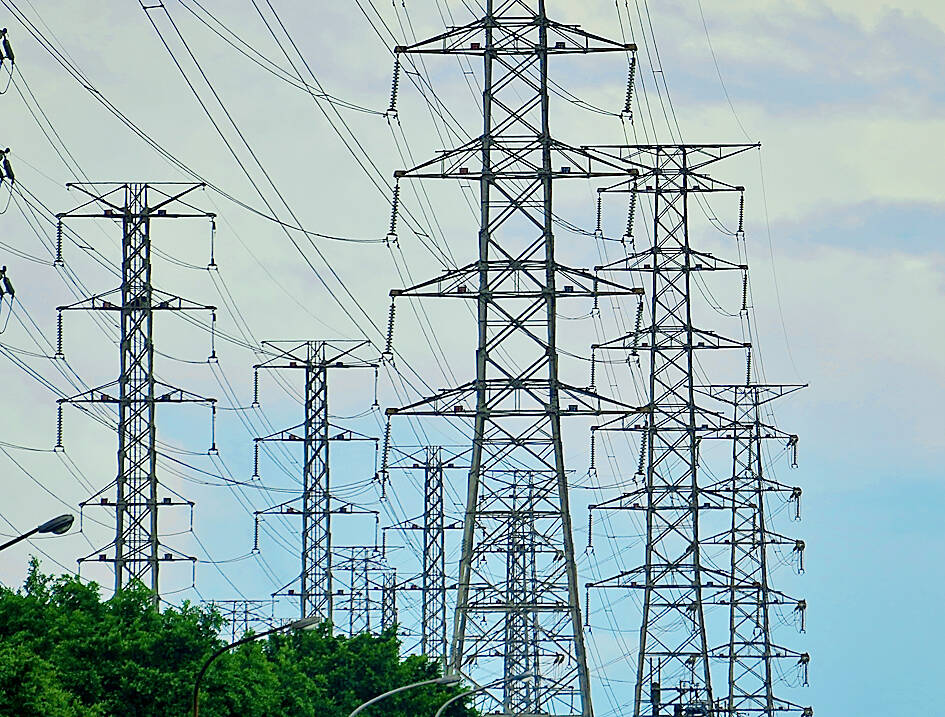Industrial electricity consumption declined 4.48 percent year-on-year last month, ending a 10-month streak of growth as the Lunar New Year holiday reduced the number of working days, the Taiwan Research Institute (台灣綜合研究院) said in a report yesterday.
However, the semiconductor sector bucked the trend, using 1.8 percent more power to meet strong demand for new technologies, such as high-performance computing, cloud computing, generative artificial intelligence (AI) and smart devices, the report said.
Tech companies also ramped up production ahead of potential US tariff hikes, it added.

Photo: CNA
The electricity prosperity index (EPI), which the institute uses to gauge the health of industrial sectors, signaled “yellow-red” for the ninth consecutive month, consistent with ongoing economic expansion, it said.
Non-tech sectors were less fortunate as they remained weighed by unfavorable global economic trends, rising costs and sharpening competition from lower-cost manufacturers in China, Vietnam and Thailand, the report said.
Taiwan’s strict environmental policies have increased production costs, while global shifts toward green chemicals are adding pressure to chemical product makers, it said.
Additionally, China, once a major importer of Taiwan’s chemicals, has expanded its domestic production, reducing reliance on Taiwan, it added.
The report also shed light on different power use declines among local sectors last month, with the high-voltage industrial sector falling 3.79 percent, the manufacturing sector dropping 4.16 percent and the service sector down 1.89 percent.
Looking ahead, the AI boom would continue to fuel growth for the semiconductor sector, helping to offset some of the downturn in non-tech industries and support Taiwan’s overall economy, the institute said.
Taiwan must closely monitor global economic uncertainties such as US President Donald Trump’s tariff threats to mitigate downside risks to local industries, it said.

Sweeping policy changes under US Secretary of Health and Human Services Robert F. Kennedy Jr are having a chilling effect on vaccine makers as anti-vaccine rhetoric has turned into concrete changes in inoculation schedules and recommendations, investors and executives said. The administration of US President Donald Trump has in the past year upended vaccine recommendations, with the country last month ending its longstanding guidance that all children receive inoculations against flu, hepatitis A and other diseases. The unprecedented changes have led to diminished vaccine usage, hurt the investment case for some biotechs, and created a drag that would likely dent revenues and

Global semiconductor stocks advanced yesterday, as comments by Nvidia Corp chief executive officer Jensen Huang (黃仁勳) at Davos, Switzerland, helped reinforce investor enthusiasm for artificial intelligence (AI). Samsung Electronics Co gained as much as 5 percent to an all-time high, helping drive South Korea’s benchmark KOSPI above 5,000 for the first time. That came after the Philadelphia Semiconductor Index rose more than 3 percent to a fresh record on Wednesday, with a boost from Nvidia. The gains came amid broad risk-on trade after US President Donald Trump withdrew his threat of tariffs on some European nations over backing for Greenland. Huang further

CULPRITS: Factors that affected the slip included falling global crude oil prices, wait-and-see consumer attitudes due to US tariffs and a different Lunar New Year holiday schedule Taiwan’s retail sales ended a nine-year growth streak last year, slipping 0.2 percent from a year earlier as uncertainty over US tariff policies affected demand for durable goods, data released on Friday by the Ministry of Economic Affairs showed. Last year’s retail sales totaled NT$4.84 trillion (US$153.27 billion), down about NT$9.5 billion, or 0.2 percent, from 2024. Despite the decline, the figure was still the second-highest annual sales total on record. Ministry statistics department deputy head Chen Yu-fang (陳玉芳) said sales of cars, motorcycles and related products, which accounted for 17.4 percent of total retail rales last year, fell NT$68.1 billion, or

HSBC Bank Taiwan Ltd (匯豐台灣商銀) and the Taiwan High Prosecutors Office recently signed a memorandum of understanding (MOU) to enhance cooperation on the suspicious transaction analysis mechanism. This landmark agreement makes HSBC the first foreign bank in Taiwan to establish such a partnership with the High Prosecutors Office, underscoring its commitment to active anti-fraud initiatives, financial inclusion, and the “Treating Customers Fairly” principle. Through this deep public-private collaboration, both parties aim to co-create a secure financial ecosystem via early warning detection and precise fraud prevention technologies. At the signing ceremony, HSBC Taiwan CEO and head of banking Adam Chen (陳志堅)